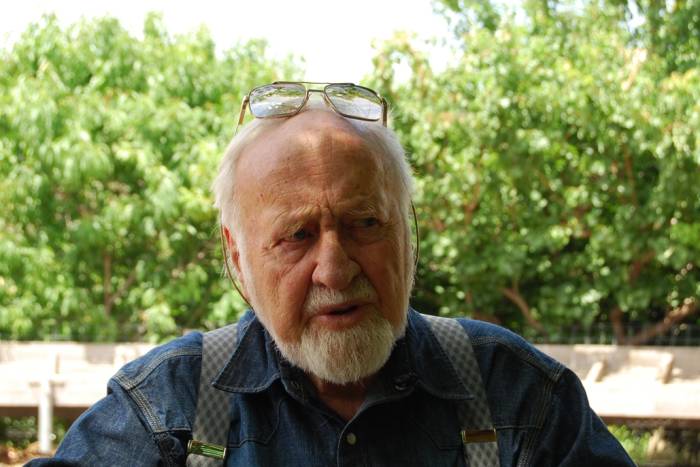Moondog, The Blind Genius of New York’s Streets
Admired by Charlie Parker, covered by Janis Joplin, invited by Steve Reich, Moondog is one of history’s most brilliant and eccentric characters.
One of the most important men in the music and ideology of the second half of the 20th century was a vagabond musician known as Moondog. Almost forgotten today, once upon a time the world saw him every day. New Yorkers and tourists would see him as they walked up Sixth Avenue and 53rd Street, where he lived for 30 years as an old and blind bard playing music he composed himself on instruments that he invented.
Moondog, who was almost two meters tall, would be standing there like a statue armed with a lance taller than he was, wearing a skin helmet with Viking horns, a cape and a long, white beard ––like a visitor from another world. People would pass him without ever realizing that there was one of history’s great composers and one of the first real figures of US counter culture.
Louis Thomas Hardin was born in Kansas in 1916, the son of a preacher and a church organist. He had a book-filled childhood – from Mark Twain to the Bible –, which was also filled with musical instruments, particularly percussions, that his parents provided him with when they saw his early aptitude for music. But one 4th of July, when he was 16, a dynamite-cap blew up in his face, leaving him permanently blind.
In the years following his accident Hardin had to learn Braille and get used to his parents’ divorce. During that time, his sister Ruth spent time with him reading out loud all kinds of philosophy, science and mythological books which would be reflected in his future personality of self-taught wisdom, but above all as a Viking; he had fallen in love with Nordic myths and considered himself one of the druids born out of time and out of context. Life would arrange itself so that Hardin, divorced from an older woman and isolated from his friends, would pack up his homemade musical instruments and move to New York in search of a career as a composer.
Once in New York, without money or contacts, he would hang out outside Carnegie Hall to talk to composers and musicians that came and went. After a couple of weeks he met musical director and conductor of the New York Philharmonic Artur Rodzinski, who, after listening to him play, offered him a deal: if Hardin could produce a favorable composition, Rodzinski would allow him to conduct it in the Philharmonic. But he would have to produce it himself.
Hardin couldn’t procure enough funds to pay an assistant to translate his music from Braille and he went back to playing on the streets. But that’s when the real transformation of Hardin into a fantastical bearded Viking and genius of improvised music began. In 1947 he dubbed himself “Moondog” in homage to a pet he had during his childhood that “howled at the moon.”
Sheltering in the streets of New York, Moondog took inspiration from the sounds that surrounded him – foghorns, cars, voices, echoes – and from his catalog of mythologies and Native American sounds, and recorded his first album, “Moondog Symphony”, which resembled nothing previously recorded.
Of course, one of the musicians who were blown away by Moondog’s genius was Philip Glass, who, after hearing his symphony, invited him to live with him for a whole year, during which they composed music every night accompanied by the great Steve Reich.
Like a Walt Whitman who sang on the streets of America – which was the streets of New York –, Moondog sold his poems to passersby and began to gain fame as one of the city’s most interesting eccentrics and an acclaimed musician. One day, while he was crouching in the street playing a string instrument, he was offered the opportunity to record some singles, which led him to record an entire album – a collection of eight rare and exotic songs – called Moondog on the Streets of New York that even earned him a review in The New York Times.
With the arrival of the beatniks and hippies in the sixties, the appreciation for his non-conformist and strange music grew exponentially. Jazz legends such as Charlie Parker and Charles Mingus considered Moondog an innovative genius. Janis Joplin recorded a cover version of his song “All Is Loneliness” and introduced him to a whole new generation of New York hipsters. He shared the stage with Ravi Shankar, Salvador Dalí, William Burroughs and Allen Ginsberg, among others. In 1969, CBS Records lent him an orchestra with which he recorded Moondog, a compilation of his songs and, two years later, Moondog 2.
But despite all that, Moondog remained faithful to the streets of New York, and to giving life to that anachronistic Viking ghost. He didn’t like fame or recognition and simply spent his time improving his instruments and his poems. When asked if he was embarrassed to beg for money, Moondog’s reply was candid: “It’s not degrading. Homer begged, and so did Jesus Christ. It was only the Calvinists who ordained that no man shall eat who does not work.”
Eventually, by luck or force of coincidence, Moondog ended up living in Germany where his mythological gods Odin and Thor once reigned. New Yorkers, who had become fondly used to the vagabond poet, thought that he had died. But he had gone to Germany to play a series of concerts sponsored by a German radio station that discovered him through his records.
There he met a 24-year-old woman called Iona Sommer who took him home to her house. Sommer had heard his music and could not believe that such a talented man could live on the streets. She became his publicist, producer, agent and transcriber. Moondog released several albums with her help. “I am living in a composer’s paradise,” he told a reporter, shortly after moving in with Sommer. “I am surrounded by musicians, I get my meals on time, I’m warm, and most of all I’m free for my music.” With that freedom he produced a lot of music, including some of his best, and went on tour in the UK, Austria and France. He even conducted his avant-garde music before royalty. He only returned to New York once to direct, in his humble and strident way, the Brooklyn Philharmonic Orchestra.
But he would never return to his ghostly house on Sixth Avenue.
On September 8, 1999, at the age of 83, Moondog died in Münster, Germany. By then he had influenced some of history’s best musicians, such as Janis Joplin, Benny Goodman, Philip Glass and Steve Reich, and had been celebrated by writers of the Beat Generation and the flower children. Today he is a source of inspiration for musicians such as Anthony and the Johnsons, John Zorn, Björk and the Kronos Quartet.
But Moondog, as the last and most premonitory apparition of the druids, changed much more than music. He left perhaps a skeleton key to rekindle faith in humanity, faith in the battle for independence, in the kindness of strangers and, of course, in the music of the streets.
Author’s Twitter: @luciaomr
Related Articles
Why shrinking the size of life is synonymous of well-being
One of the great misunderstandings regarding modern spirituality is that to achieve it requires many things: readings, food, exercise, travel, groups and techniques. But perhaps it should be suggested
What is energy medicine yoga?
Energy Medicine Yoga (EMYoga) is slightly different from other types of Yoga, but it provides the same benefits in addition to a few very specific ones. One of them is that it gives you much more in
Red tea, the best antioxidant beverage on earth
Red tea is considered to be the most unusual of teas because it implies a consistently different preparation process. ––It is believed that its finding came upon surprisingly when traditional green
Is the internet on the verge of self-awareness?
More than 50 years ago, Marshall McLuhan described technology as an extension of our brains, constantly mutating and branching out. “These new media have made our world into a single unit,” the
How art can help us to age, healthy
Perhaps many of us already well know the formula for aging in health and wellness. A balanced diet and, as much as possible, one that’s natural. Keep our brains active and stimulated. Preserve and
Earthanima: documenting the living language of nature
The basic intuition that the Earth is alive and that nature has a language through which it communicates with us is what prompted this wood-art project named Earthanima. For the past couple of years
Dialogue with the Dalai Lama on science and spirituality
The Dalai Lama has been interested in science since he was a child. Over the years he’s visited many laboratories and has attended conferences that discuss consciousness from the scientific point of
Brian Eno's literary recommendations to rebuild society
Artists and authors often get asked what books or records they’d take with them to a deserted island. On principle, this is naturally an extreme anthology: urgency and tragedy guide its selection. It
Bill Mollison, natural ideologue and father of permaculture
Permaculture has established itself as a path towards communitarianism, but one that is in full symbiosis with nature. In practice, it is more than just a combination of agriculture, horticulture
A New Year's resolution for the earth
Worrisome quantities of waste are generated by human populations. Especially in cities, these have reached unprecedented and alarming levels. A largely uncontrolled practice, it affects everything on










